10th August 2022
The Spokesmen Cycling Podcast
EPISODE 304: In conversation with e-bike guru Ed Benjamin
SPONSOR: Tern Bicycles
HOST: Carlton Reid
GUEST: Ed Benjamin
TOPICS: The growth of electric bikes since the 1990s and their future, with e-bike guru Ed Benjamin.
TRANSCRIPT
Carlton Reid 0:12
Welcome to Episode 304 of The Spokesmen cycling podcast. This show was published on Wednesday 10th of August 2022..
David Bernstein 0:23
The Spokesmen cycling roundtable podcast is brought to you by Tern bicycles. The good people at Tern are committed to building bikes that are useful enough to ride every day, and dependable enough to carry the people you love. In other words, they make the kind of bikes that they want to ride. Tern has e bikes for every type of rider. Whether you’re commuting, taking your kids to school, or even caring another adult, visit www.tern bicycles.com. That’s t e r n bicycles.com to learn more.
Carlton Reid 1:03
Hey there I’m Carlton Reid and on today’s show I’m glad to welcome back e-bike guru Ed Benjamin. Veteran e-bike guru Ed Benjamin, the go-to guy for e-bike growth stats and also the go-to guy for bike industry folks who want to figure out a complex sourcing challenge. And I said “welcome back” because Ed has been on the show before, but not since 2009 and I can’t link to that episode because it was recorded at the Interbike trade show in Las Vegas and was streamed live to a TV audience of … well, a TV audience. We talked for a little under an hour and you’ll soon hear why I call him a guru.
You were basically
telling the global bike industry, there was an E bike boom coming back in the days even of lead acid batteries. So 2025, perhaps even more years ago. So are we at that future? That you said back then we should expect? No, I think we are the My understanding is that
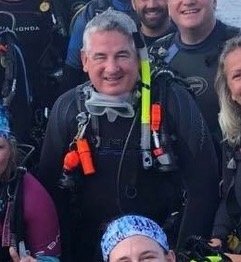
Ed Benjamin 2:22
No, I think we are. My understanding is that Europe, European European market is going to be about 5 million units this year. The American market is not far from a million units. I’m predicting it at 700,000 for this year, 880,000 for last year, but things are cooled off a little bit here. The Chinese market is more than 30 million. And
hey, we’re there. This is we are a significant and important part of the transportation mix for most of the world.
Carlton Reid 2:54
So you were saying that before? Well, people are saying you’re crazy. When you were saying that 25 years ago? Probably I was saying you were crazy as well, Ed. And I have known you for an awfully long time. And you were saying those things and people were going yeah, that’s not going to happen. And absolutely, as you’ve just said that it’s absolutely happened in China. First, it absolutely happened in Europe. I mean, America has been a slower burn, hasn’t it?
Ed Benjamin 3:19
You know, adoption was very quick in Asia, partly because the vehicle was perfect for the dense Lee inhabited coastal cities of Asia. And because there was strong government encouragement that the Chinese governments in particular, recognise that the small vehicle was what their people were going to use and the small vehicles were emitting a lot of pollution and they’d better do something. And so they basically provided as they put it, strong encouragement for the electric bicycle by discouraging two stroke engines by discouraging mopeds, gasoline assisted bicycles, etc.
So they were fast, you know, from the time that the technologies that enable electric bicycles to be a commercial success were available, which I’ll suggest that they were available at the correct price starting in 1994.
From 1994 to the time the Chinese were reacting was two years to the time that the Chinese electric bicycle was all over the place in many hundreds of 1000s less than 10 years. And today, there’s probably more than or something very close to 300 million electric bikes used in China, everything that acid may still lead acid mainly. Well, yeah, lead acid is still a major, major energy storage device. There’s a lot of the wire lithium is the primary battery metallurgy for the Western market. Lead Acid is still the
Primary metallurgy for most of the Asian markets with lithium making some grounds make gaining ground I should say. So yeah, and that’s been an issue, you know, lead acid batteries, they for heavy daily use, they typically last about a year, and now they need to be recycled. And, and most of the cities of Asia now have vigorous lead acid recycling,
where in the West, we are using a lot of lithium batteries. And we don’t really have a way of dealing with the old lithium batteries yet. Because in the EU that just brought in a new rule that you’re going to have to recycle those. So you say manufacturers and suppliers are going to have to do something with their then EMI and batteries.
Well, and they would say we are doing something.
And maybe a more honest thing would be for them to say, we’re in the process of figuring out what’s the best thing to do with it. An awful lot of lithium battery recycling today is shred it and put it in a landfill. But I’d like to personally, I believe that it won’t be very much longer before some of these outfits will succeed in commercially viable recovery of the lithium materials, which have a significant value.
Carlton Reid 6:19
We got somebody but you got companies like Redwood materials who are doing it for cars. So that was that was a former
executive from Tesla who realised that this is gonna be a big thing. So presumably of if Tesla can do it for a company that sprang from Tesla can do it for for cars, bikes can surely do it?
Ed Benjamin 6:38
Oh, yeah. And I think that we’re in the process of getting there. Keep in mind that the battery package for car which can be 1000s of cells, and the battery package for bike, which might be 40, maybe 60 cells, different, different size of scale. But if we look at lead acid battery recycling, which is something the western economies do very well, if I have a lead acid battery, whether it comes from a car or an electric bike, I think there are four or five places that will accept it for recycling within one mile of my home. And we’ll see the same thing happen with lithium. In the end, we’ll see the lithium recaptured lithium metal, the lithium salts have a value that are going to have more and more value as we build more and more electric vehicles that use lithium for energy storage. So we’ll get there and there’s probably some lithium guy that will be listening to this and going hey, wait a minute my company’s blah blah, blah. Yeah, we’re making progress.
Carlton Reid 7:43
Now, correct me if I’m wrong, but I believe you’re speaking to us here from Fort Myers in Florida from Fort Myers, Florida that’s in the news at the moment is Florida I know you’re about 125 miles away from completely opposite from from the building that’s in the news at the moment but you’re in your you’re in Florida.
Ed Benjamin 8:01
I’m in Florida and we are often in the news.
Carlton Reid 8:04
Now the reason I bring up Florida because it’s I’ve never been there in the in that have never been ever but I know that in the summer. It’s meant to be incredibly brutal to live in Florida. Now. Know what correct is that?
Ed Benjamin 8:20
Oh, no. I’ve been reading about the temperatures in the UK recently. You guys have a tougher than we do. We have a lot of air conditioning you don’t.
So you know, yeah. It’s warm here in the summertime.
Carlton Reid 8:34
And that’s a different sound. Where I was going with that was just is that not just somewhere perfect for an ebike because you don’t want to sweat you don’t want to you know go on your your standard bike and ride around but you might within a bike is that well, it’s a good place for e-bikes.
Ed Benjamin 8:52
There’s a couple of markets that really stand out for the electric bike. One of the markets is the older person who wants to ride his electric bike around often in the evening, often staying in the neighbourhood and chatting with his neighbours or her neighbours. Often couples riding together and we have a lot of that in Florida we have a lot of retirees that live in areas that are quite pleasant to go for a casual ride. And they’re finding that electric bike is something that they enjoy riding, it’s easier to ride and it’s something to talk about when they when they visit with their neighbours. I look at my new electric bike. So there’s been a lot of that that market is very strong in Florida. Another. Market builders very strong is dense urban environments, cities where parking your car is a major expense or a major inconvenience. places like Boston, San Francisco, New York City, South Miami. These are all places where they have owning a car is just a pain in the butt. And in Florida we do have
have year round cycling weather, although we also have some very serious rains that visit us most afternoons in the summertime.
But that’s manageable. So yeah, so the electric bicycle in the cities of Florida, it’s a natural, but the electric bicycle in the cities of the world is unnatural. If we look at where our electric bicycles used most, the most, I would say it’s flat coastal cities all over the world.
Carlton Reid 10:27
You mentioned the oldest demographic. And of course, that’s that’s what the industry was very frightened of promoting to, and they very much wanted younger people to get into into E bikes, it took an awfully long time of marketing to that demographic. Do you think the bike industry has succeeded? Is the bike a young person’s product?
Ed Benjamin 10:47
Well, one aspect of it is yes.
There are two things that have happened. One of them is the young people, I’m talking about the United States. But I think there’s a lot of overlap here with Western Europe. The young people of America are broke, they’ve got school debt, they’ve got challenging in income issues for most of them. And owning a car is expensive. So riding a bicycle. And remember, these are young folks are still perfectly capable of riding a bicycle. But the electric bicycle means they can go farther, they can live farther away from the work or farther away from the metro station. It means that they get to work without being without perspiring without needing a shower. So we have young people turning to this as a mode of transportation that suits today’s reality. We also have them turning to it for recreation in the United States of bicycles have been sport, fitness and recreation, that we even though there’s always been a relatively small percentage of our bicycle riders that have used them for transportation, we don’t think of them as transportation now and in Asia, the first thought you have is that’s a way to get to work or that’s a way to get to the metro station or the store. And you almost see that attitude. You see it in some Western European cultures to a greater or lesser extent of bicycles transportation, of course, in America that there’s no of course, a bicycle sport, fitness and recreation but but but but but mountain bikes, ah, mountain bikes, we love go mountain biking, we love to ride off the road, and somebody has been turning gravity up every year of my life. And as they turn gravity up, I find an electric bicycle allows me to continue riding in the mountains that allows me to continue having a totally enjoyable afternoon and rather than the embarrassment of walking up the hill, the so the electric mountain bike fit very neatly into American ideas about what the bicycle should be. It’s fun. It’s it’s fitness is recreation. And it was like somebody threw opened a couple of huge doors into the electric mountain bike world and said, Come on in here. It’s fun. And I think I’m quoting Gary Fisher correctly, Gary Fisher, of course, is a an institution, a legend in the mountain bike world. And Gary said at one of the trade shows that the electric mountain bike adds 15 years to your mountain biking season.
Carlton Reid 13:21
So that worked out there. Also, there was friction there with with with getting it on to certain mountains and in certain
national year properties where the Rangers didn’t want mountain bikes to be electrified. And they didn’t even like mountain bikes if if truth be told. So there was not much in there to
know there.
Ed Benjamin 13:43
Yes, there’s, of course there’s friction there. And
but I would suggest it’s really more from other users. A few years ago, actually, a couple of decades ago, I was doing an internship in Boulder, Colorado, and I was fascinated. They have a wonderful bicycle path that goes up the mountain stream. And I was fascinated by all of the friction, I guess would be the way to put it. The dog walkers hated everybody. The roller skaters hated everybody the bicycle riders are going this is our bike path. You dog walkers and rollerbladers need to get out of our way. And then there’s the skateboarders. And then there’s mom with us baby stroller. And all of these groups were trying to share the same piece of asphalt and none of them were happy with the presence of the others. What this taught me was people are a messy bunch. I don’t care what it is how far from the road it is, or how sensible it is. Somebody is going to bitch about it. And by the way, let’s not forget the horseback riders on the mountain trails in the back country. They don’t like bicycle riders, they also don’t like walkers. So are human beings going to just instantly say, Hey, this is great. Let’s share
not my experience. So I don’t you know Yes, I observed that there is this kind of conflict I observed that P
Pull for bikes and some of the other organisations have done an awful lot of good work to try to formalise the where you can and where you shouldn’t and to negotiate peaceful coexistence as best they can. I’m really impressed with the work they’ve done. But human beings are a messy bunch. They’re gonna grow up in each other.
Carlton Reid 15:21
Tell me how you got into the bike industry. And that’s before the ebike stuff. And before you owned a bunch of bike shops in Florida, so how did you originally get into bikes?
Ed Benjamin 15:34
Alright, my first bicycle shop job was in 1969. But before that, I was working at a McDonald’s as a teenager. And there was this nutcase guy there that had this incredibly expensive bicycle, I think he paid more than $200 for it back in back in the 1960s $200, paid for a bicycle was mind bending. And this guy was a big, strong, good looking guy. He was also working in McDonald’s. And I was fascinated by his bicycle. And I said, What is this all about? This is this is a racing bicycle. It’s a real racing bicycle. And I thought that was just the coolest thing. I just was absolutely fascinated with the bike, I was fascinated with the idea of racing bicycles. And I got started racing bicycles as a result of Bob Easton and his Raleigh professional that he rode, rode to McDonald’s as his way to get to work. So I followed along behind Bob Easton, learned to be a bicycle racer, won a few races last a lot of races, wound up working in bicycle shops, as many bicycle racers do. And so I was a skinny teenager on a crappy bicycle, who rode so much that he won races and that allowed him to buy a better bicycle. And that’s how I got started.
Carlton Reid 16:48
So that was your archetypal bike, boom. 70s bike boom person in 1969, you know, 70
That’s, that’s when the, you know, the National Geographic is covering it and saying there’s a boom in bikes happening. So you’re that guy?
Ed Benjamin 17:04
Well, if you look at the movie, Breaking Away, some of the people that were extras in that movie were the people that I rode with, and, and that movie resonated with us. That was us.
Even down to the very ugly shorts that caused every girl that saw us and them to go, ooh.
Carlton Reid 17:25
Okay, and you’ve segued from that into owning bike shops. How did that happen?
Ed Benjamin 17:33
Oh, I Well, I worked at bicycle shops assembling bicycles. I later wound up managing bike shops. And then, you know, I went to the University learn to went and got a degree that would not allow me to make a living, got out of the university and said, Well, one thing I do know how to do is work in a bicycle shop. And my father and I identified Fort Myers, Florida as a promising market. We bought a bicycle shop that existed in Fort Myers and we started operating that store and we kept we expanded it into four stores. And then to, to, to beat you to the next question in the in the 1990s. My father passed away from cancer my, what my chief financial officer who was my wife, decided she didn’t want to be married to me. So she became an ex wife, my store manager, my brother got hit and killed in a car bicycle accident, and I’m going I don’t want to be in the bicycle shop anymore.
I’d been good at it, but I didn’t want to do it anymore. But I was totally fascinated with this new thing called electric bicycles. And that’s how I got interested in started chasing electric bicycles
Carlton Reid 18:45
that kind of Lee Iacocca kind of period?
Ed Benjamin 18:52
Lee Iacocca was talking about electric bicycles very close to the same time. And I frankly, I found his vision or the things that he said I found him inspiring,
Carlton Reid 19:03
describe, describe who he is, an executive from the motor trade basically?
Ed Benjamin 19:09
Yeah, here’s an executive who had had been involved at the Ford Motor Company and and Chrysler Motor Company, highly articulate, very good crews, charismatic.
You know, and here was a guy who was famous for bringing the Ford Mustang into existence. He had been involved in every aspect of the automobile industry, and he was an icon of the automobile industry in a very, very big deal. And here, he was fooling around with electric bicycles, really. And but what that gave me was validation. Not only was he articulate and and charismatic, and he was saying things that really resonated with me. But here he was making this stepping from the automobile industry, which in American minds is the main event, stepping from the automobile industry into the electric bike business.
Now it turns out that Lee was not very good at the electric bike business. But he definitely shaped a lot of my early interest. And unfortunately, Time magazine asked me, I think it was a 1997. Time magazine asked me for a quote about how do you think Lee Iacocca is going to do and I said, Well, he’s not going to sell 50,000 bikes in his first year. And leave parently took personal offence to that, and my chances of becoming least buddy died in that statement.
Carlton Reid 20:36
But did he? Did he not sell that? Were you right?
Yeah, no, his his his business success with EV global motors. There wasn’t any business success.
Ed Benjamin 20:45
You know, it was inspirational. But he, the market was not ready to buy an EV until he wasn’t ready to buy electric bikes, the United States and it wasn’t ready to buy the global motors bike. And Lee, who apparently was quite brilliant in the world of automobile companies appeared to be not very good at a small company, small startup company.
Carlton Reid 21:12
That wasn’t a pedal assist bike that was almost a electric motorbike.
Ed Benjamin 21:16
Yeah, yeah, that’s what we call a class two bike.
Carlton Reid 21:19
Now it was controlled by a throttle, but they did open a lot of people’s eyes, including yours by the sound of it to their sector. And then other people came along and started doing stuff. So what what were you doing in E bikes at this time? What are you physically? How are you connected to the industry?
Ed Benjamin 21:34
Well, in 1996, I decided that I was going to focus my attention on the electric bicycle world or electric bicycle industry. Now keep in mind that electric bicycle had really become a commercial success starting in 1994 in Japan, and there was we were in 1996, we’re reading about oil to Europe, the Chinese government is banning mopeds and encouraging electric bikes and so on. And, and I was
had, we had a customer in the bike shop, a guy named Dr. Frank Jamison, and Dr. Jamison had been investigating and researching the electric bicycle business since 1993 94. And Dr. Jamison got to know him because he’d bring these electric bikes in and he would need them fixed. Most of the problems were bicycle problems, by the way. So we took his bikes for him. And I got to know Dr. Jamison, and then Dr. Jamison, who was not a young man asked me to go to China for him and visit a trade show. And, of course, I was strongly interested in doing that. Although I was a boy from Kentucky who had never travelled, I’d never been out of the country, I’d never certainly never been to Asia. And here Dr. Jamison was sending me on this this fact finding or information gathering mission. And wow, that was such an eye opening thing is a result of Dr. Jamison’s introductions, I wound up going to a trade show in Germany, and then to a trade show in Shanghai. And by the time by 1997, 98, I was convinced that electric bicycles were going to be the main event for the bicycle industry, they were higher price they were they used up their battery, they they were going to be written more, they’re going to need more service.
This was going to be the moneymaker. I was absolutely convinced starting in 96, 97, that this is going to be the main moneymaker for the bicycle industry. While most the bicycle industry thought that was absurd. And I was reasonably well known in American bicycle industry, because I operated these bicycle shops and had operated them successfully. And I’d been around for a long time. And I had people telling me that you’re going to be broke forever, you’re never going to make this consulting company work. And, and there was a lot of doubt in my own mind. But
that relationship with Dr. Jamison, he is encouraging me to go out into Europe and Asia, and learn about it and, and make friends. And one of the things that happened quite a lot at that time was I would go to a factory, for example, TN di or Small Antelope in in Suzhou. And I would go to the factory to visit the factory and the people in the factory would say, what are you here to to buy? And I’m not here to buy anything. What are you here to sell? I’m not here to sell anything. Why are you here? I want to make friends. And that turned out to be a really good thing to really good approach to this. So I spent five or six years basically travelling around to the electric bike events and electric bike factories, electric bike component makers, battery makers, motor makers, etc. And my only intention was simply to develop a network to make friends to get to learn from these folks. And that worked. And the result was that I was early in and and
got around a bit. And that created the the foundation for a future consulting business and the foundation for what would become the Light Electric Vehicle Association.
Carlton Reid 25:11
Lever. Lava. How would you pronounce that?
Ed Benjamin 25:14
Well, I usually say l e v a. But we have other folks that say laver. Yeah, you know, I think doesn’t matter. Because
Carlton Reid 25:23
obviously, so that’s vehicle. So that’s not just, you know, e bikes. So what classify what that what that encompasses?
Ed Benjamin 25:34
Well, a vehicle, there’s a device that carries somebody from A to B. And, you know, we could say that, automobiles, buses, trains, aeroplanes, skateboards, the list is a long of the devices that human beings used to get from A to B. And when we, when we named the Electric Vehicle Association, we had thought about calling it the electric cycle Association. But the problem was that, or the challenge that we saw was that we were going to see a lot of, of categories of electric powered micro mobility vehicles that have that are not electric bicycles. They were going to be, we didn’t know exactly what they were going to be. But we could see these electric mini scooters that people stand up on, we could see
a lot of innovative electric vehicles coming out of Europe, such as the trike.
And since then, we’ve seen continued to see a very interesting innovation in micro mobility vehicles. So is the electric bicycle, the ultimate ultimate micro mobility vehicle. It’s a very good one, and it’s working really well and it’s selling really well. But isn’t the ultimate one. I don’t know. I kind of doubt it. I suspect that we’re kind of, you know, if you think about the automobile industry in its early days, 1906 1910. They call them horseless carriages. And we if we saw horseless carriage today, we would chuckle and say, Boy, they’ve certainly evolved. I think we’re going to see similar evolvement from the electric bicycle. My grandkids may be looking at electric bicycle and chuckling and saying, Well, that’s not what we use today.
Carlton Reid 27:19
Is your dog okay by the way, is it like panting to see you or?
Ed Benjamin 27:24
No, there’s some landscapers that have arrived. And even with the door closed, she feels that she has a secure security duty to inform the landscapers that she’s got her eye on them. I apologise.
Carlton Reid 27:37
What kind of dog have you got there, Ed?
Ed Benjamin 27:39
She’s a Labrador.
Carlton Reid 27:41
Okay. Labradors are not normally that barky. I was thinking of a different breed to that, but okay.
Ed Benjamin 27:47
Now she’s a four year old Labrador who takes if if we let her outside, she would run up to each one landscapers and greet them enthusiastically, and then come back inside and be quiet.
Carlton Reid 27:59
Yeah. No, I’m with you there. So going back to
vehicles, electric vehicles. I do see I did a story a while ago, two years ago now. Time flies, but on the the Canyon kind of electric car. So
you know, the Canyon than the mountain bike and the road bike people clearly think there’s a potential future there for an electric vehicle,
basically, but they were very adamant that they were in fact, when I mentioned the Sinclair C5 to them, they kind of knew exactly what I meant. And they knew that’s what they had to not do. Does that Sinclair C5, you know, not hold that category back?
Ed Benjamin 28:46
You know, I have to confess that I don’t pay a lot of attention to
anything more than three wheels. And so I would suggest that
the human race is going to by are going to start using a wide variety of vehicles that
have many sizes and many characteristics, but
I have reasonably informed opinions about ones that have two or maybe three wheels, and anything more than that. I can say I see it coming. But I don’t pay that much attention to it.
Carlton Reid 29:19
So your ltva Could one of the categories. There are the one of the kinds of . It’s not four wheels.
Ed Benjamin 29:27
Yeah.
I’m sorry, I must have missed something there. Maybe I am not familiar with the Canyon vehicle.
Carlton Reid 29:36
I think the Canyon is a trike it I’m pretty sure. I think on it certainly smart it was small enough to fit into, into into a bike lane. That’s where they that they’re, they’re pitching it.
Ed Benjamin 29:47
Alright, how are we spelling this?
Carlton Reid 29:52
Canyon, like the bicycle company, the bicycle company, it’s basically they’re doing a light electric vehicle as a concept vehicle
Yeah, which they did, basically electric, you know, they would they would have it was actually before they started doing electric bikes, but they knew they were gonna be doing this electric in effect small car. It’s not commercial yet, but just the fact that they were looking at this space, you know, for Canyon to do that was really interesting.
Ed Benjamin 30:18
Yeah, it’s been I found it it’s been around for about a year
the
this you know,
this kind of light electric car, I see it as a no brainer for
the dense urban environment that human beings are moving into more and more often.
Carlton Reid 30:38
But it’s also and we could probably build it using mostly electric bicycle monitoring. And I think that’s their idea. So this could be quite light, quite inexpensive and quite functional. But I’ve not been paying attention to this category. Because we do. I mean, if you go to the Netherlands and you go to Amsterdam, you see these kind of vehicles already dotting around that, you know that the bike paths of Amsterdam, you know this
Yeah, since at least 20 years they’ve been tottering around, but they haven’t taken off massively. So I’m just wondering what would it take to make them take off probably access to safe roadways, and of course the Dutch ride those things on the bicycle path.
Ed Benjamin 31:23
But again, it’s a simply a category that I have not been paying much attention to I recognise that exists. I probably would own one myself. If I were riding through the rainy days of Amsterdam, but I’m afraid that not my not my area of knowledge.
Carlton Reid 31:42
Okay, so um, wasn’t gonna go, I won’t go into like the villages type, you know, golf cart, electric car. That’s kind of not your territory. It’s got to go shape thing.
Ed Benjamin 31:54
The Villages using an electric golf cart. If they could buy one that had a diesel exhausted put up black smoke, that’s the one they would like better.
case you don’t know what the villages are a hotbed of everything that’s stupid about the baby boomer generation of which I’m a member. Yes, yes. But the villages are a concentration of conservative, upside down right wing. We don’t like anything that’s good for anybody else thinking. I’m sure somebody will hear this and say something nasty about me. Because that’s what they do in the villages.
Carlton Reid 32:30
I’ve done a few stories on it. So it’s an interesting place. So mid motor, hub motor, bolt on accessory to make your wheel go round. Do any of these things matter? Is it just the fact that you should be getting an electric bike? Or do you think there should be a form of technology here? That’s that’s better than the others?
Ed Benjamin 32:50
Well, they’re they’re different. They have different strengths. They have motor bike, the motor is inexpensive, it works really well. It’s almost absurdly reliable. It uses a space in the bike that nothing else does, you can bolt it into an ordinary bicycle frame. Wow, lots of advantages. Disadvantages, well, if you can’t use the bicycle, Trent, you can’t run the power of the motor through the bicycle transmission. And it’s, that’s what the great advantage of the mid motor bike where you’ve got the high torque motor of the human being, somebody called it the meat motor one time or the muscle motor, that’s a very high torque motor, and you add to it and an electric motor, and then you run it through the sophisticated and broad range of a bicycle transmission. And we have one impressive vehicle, we can climb mountains, we can go fast we can do we can wow, this is a great combo. The downside is that it’s more expensive, partly because there’s a lot more machined parts in there. And partly because it’s a generally speaking, it’s a more sophisticated and tightly integrated system. But the performance advantage is significant.
Other types of electric vehicle or electric bicycle propulsion, they’re very small by comparison, today, we’ve got a lot of motorbikes, they’re by far the unit, the dominant in Unit numbers. Motorbikes by far the dominant in terms of attention, because of their superior performance and higher higher prices. And because the people that saw them have got good marketing skills, the bikes that don’t fall into either those two categories, ones that might have a motor mounted outboard of the rear triangle or a motor that rubs the tire or some other innovative way, but for the most part, they’re really small at this time. Is there something lurking out there that’s just going to take over? Maybe? I don’t, I don’t, I don’t see it right now. Most of the other ideas are find that their useful niche or their commercially viable niche is as a DIY kit or an aftermarket kit, for example.
A unit that rubs the rear tire or uses a rear wheel as its gear reduction
is very inexpensive and very easy to instal. And that makes it a very attractive aftermarket kit, but it doesn’t climb hills worth anything and it you run it through what anything wet road or a puddle and doesn’t work at all. So the, you know, all of these systems have got their pros and their cons, but the dominant ones, the hub motor and the mid motor. Both of them have their particular strength, their particular application where they’re great.
Carlton Reid 35:37
Don’t be accessories, you know, those add ons, which there are, you know, any number on Kickstarter, anyone on Twitter, do you think that just basically shows you the interest in the concept, people might be frightened by the cost, so they kind of attach themselves to these lower cost options, but then eventually, they might buy that equipment and it to attach it to their existing bike. But at the end of the day, it’s been far better for them just to buy it in an electric bike, and then that’s what we end up doing.
Ed Benjamin 36:05
And that’s, that’s often their conclusion. In fact, earlier today, I was reading a interview from the guy that was running, super pedestrian, super pedestrian, commercialised the Copenhagen Wheel, which was an all in one wheel battery motor controller everything inside the rear wheel of the bicycle, very tidy. Got a tremendous amount of media attention got a tremendous amount of excitement. And I’m sorry that I don’t really remember a soft last name but a soft commented that one of the things they had learned as they sold the this all in one wheel was that an awful lot of their customers would come to the to decide that what they wanted was just a complete bike. You know, this business of installing a wheel fiddling with a wheel when you make a conversion like that. There’s no matter how skilled you are, or how good that kid is. There’s always a period of oh, I needed to adjust that or I needed to add this. And what what a soft says in his interview is they’re super peds.
Carlton Reid 37:05
Time challenge. Were the people who said I’m just gonna buy a complete bike. Oh, telling pedestrian, does that come in a bike, I’d buy the bike. I’m not interested in the wheel. Give me the bike.
Ed Benjamin 37:18
I’m sure they heard that a lot. Mm hmm.
Carlton Reid 37:22
At that junction, and I’d like to go across to my co host, David. And we’ll split for, in fact, an electric bike themed ad break.
David Bernstein 37:32
Hey everyone, this is David from the Fred cast and the spokesmen and I’m here once again, to tell you about our amazing sponsor Tern Bicycles at www.ternbicycles.com t e r n bicycles.com Tern are committed to building bikes that are useful enough to ride every day and dependable enough to carry the people you love. Speaking of being able to ride every day as a spokesmen listener, I’m going to bet that you are the go-to consultant for your friends who want to ride but are an enthusiast and need some advice on what to buy. In that case, you may have people in your life for whom you just haven’t been able to recommend just the right bike considering their stature, age mobility issues or just plain hesitant to get back on a bike. Finally, those family members and friends can experience a new bike day with the all new Turn NBD new bike day Nbd. Okay, the NBDd has been specifically designed to be confidently easy to handle and easy to ride even. Even for those folks who might be as Josh Hon, team captain of Tern Bicycle says are smaller in size and have a hard time finding a bike that fits or older riders who might not have ridden a bike in a while or riders who might have balance or physical issues or riders who are just intimidated by the sheer size and weight of the average ebike. As Josh goes on to say the NBD will be refreshingly easy to hop aboard and ride. Now how can Josh be so confident in that? Well, it’s simple. The NBD has the lowest longest step through opening of any premium ebike. So if you know someone with a knee or a hip injury or or somebody who just can’t lift their leg over the top tube of a regular bike, this alone could make all the difference plus the NBD is designed with an ultra low centre of gravity and a longer wheelbase. And what does that mean? Well, it means that it makes it easy to balance and handle. And with a lowered bottom bracket and motor the NBD is stable for all riders and particularly inspires confidence for shorter cyclists because they can easily get their feet on the ground when they come to a stop. But the NBD isn’t just for shorter riders. As a matter of fact, it adjusts in seconds. Without tools by the way to fit riders from four foot 10 to six foot three or 147 to 190 centimetres. The NBD is also super comfortable with its upright riding position, swept handlebar suspension seatpost and wide 20 inch balloon tires need to load the NBD into a car. No problem, it folds flat in seconds. How about getting into it into a smaller living space? No sweat. The NBD includes Tern’s vertical parking features, you can roll the bike into a small elevator and park it in a corner of your apartment. Now with a max gross vehicle weight of 140 kilos that’s 308 pounds, the NBD can easily carry an extra passenger and plenty of cargo with up to 27 kilos on the rear rack and up to 20 kilos on the front rack. And in fact, it works with a wide range of Tern accessories and with most child seats, as I’ve said before, and this is important to me really important safety is a core value at turn. And that’s why the NBD frame and fork have been rigorously tested by one of Europe’s leading bike test labs. That’s also why turn chooses to use the Bosch motor and battery system. It’s one of the few systems on the market that meets and passes the UL standard for battery and electronics safety read the news and you know how important that is. Now the NBD comes in two models with prices starting at $3,899 or 3999 euros and bikes are going to start arriving in stores in Q1 of 2023. For more information about the NBD or any of Turn’s wide range of bikes, just head on over to ternbicycles.com Again, t e r n bicycles.com. We thank Tern for their sponsorship of the spokesmen podcast and we thank you for your support of Tern. Once again, thanks for allowing me this brief introduction everybody. And now let’s get back to Carlton and the spokesmen.
Carlton Reid 42:07
And we are back Thank you, David we are back with with Ed Benjamin. And Ed
is I think it’s pretty safe to say is an ebike guru and is and has been talking about E bikes for longer than 27 years. Most people are 27 years old, Hannes Neupert is probably now harnessed Norbert was doing this since the 90s
Ed Benjamin 42:33
You know,Hannes was also an inspiration to me a young guy full of energy, he’s really smart.
You know, and immersed in the details of the early days of this business. And of course he had his partner
I don’t mean partner in that sense. I mean, his coworker Susanne Bruesch did a was really good at articulating ideas and spreading information. And so we had Hannes Neupert who was absolutely visionary and and Susanne Bruesch, who was absolutely a terrific communicator. And then they had this large group of smart young motivated people that would come and go you know, they would
sitting down to dinner with that group at a trade show was a cross cultural
extravaganza and quite an interesting bunch and and very very influential over the long haul about what happened with electric bikes in Europe.
Carlton Reid 43:38
You went consultancy they went a different way they kind of went into
letting people ride these things so taking them out on the road on like a road show Yes. The extra energy roadshow in effect so that was obviously you know, lots of trade shows would have them but they would go out to other places and just get people on because isn’t that the crux of this is whenever you get somebody on an electric bike it then clicks it’s like you’re gonna grill that’s what it does I like
mm hmm yeah, the kind of the the the tailwind affect you kind of give you a sense maybe not so much with a with a hub but centre where the mid motor it just you feel like Superman or Superwoman you know it’s you know, it’s right
so if that’s the case, why hasn’t it? Why did it take so long to take off in America because you’re talking about you know, America is big into into cars is that just the only reason that the the ebike took so long to?
Ed Benjamin 44:46
I alluded to it a little bit earlier.
The electric bicycle was presented to the entire world by s transportation. The Chinese developed a transportation vehicle and they were the main event for it.
reduction of product, the Germans and the French and the Italians that were involved in the earliest days of electric bicycles also thought of them as transportation and presented them as transportation. Honest. And Susie presented this as transportation. And in America, bicycle is not transportation, a bicycle if a bicycle is being used for transportation, in the 1990s, early 2000s, that’s because you’re poor, it’s because you can’t afford anything else. And bicycles are for sport, fitness and recreation. And the electric bicycle of those days was
not very interesting for Sport, Fitness or recreation. So what happened in America, I think, was a simply a cultural phenomenon. We were shown this interesting transportation vehicle, and he said, No, we used cars for that. And it took a couple decades before the American public woke up to the advantages are the benefits that an electric bicycle could bring to them?
Carlton Reid 45:58
You also like I mean, our Europeans like this as well, of course, but
more power, more torque, and specifically a throttle. So in the US, UK, and in the EU, we generally don’t have the throttle.
Ed Benjamin 46:11
Yes, US has got on one class of bike has got the throttle. What’s the sales differentiation between those which which is bigger in the US? How are those sectors doing? Well, the unit volume is heavily in favour of the throttle. But one of the things that I’ve learned is this, the majority of the people united states don’t ride bicycles, they may have written a bicycle for a while as a child. But they’re not bicycle has not been for most people, like maybe all but one or 2% of our population. A bicycle has not been a major part of their life than one or 2% of our population that has been very interested in bicycles. They’re used to buying nice bicycles at the bicycle shop. And they’re used to controlling the speed of the bicycle with their feet, the harder they push, the faster they go, that’s to them. That makes all kinds of sense. But the vast majority of our population did not grasp that idea. As an intuitive, this is the way a bicycle should be. So they were presented with an electric powered two wheeler, and told this is an electric bicycle. And you have to pedal it for the motor to run and they’re like what, but when they were presented with this, and you said here, twist this throttle, they got that they understood it, it was intuitive, and it’s also easy. So in the United States, the class to bike is the unit volume leader. Now the bicycle industry has a hard time with that because the bicycle industry, the wreath at every level in the United States, is people who like to ride bicycles, or they are maybe often former competitors. So your BMX bike race or your next BMX or x triathlete, I shouldn’t say x, you’re you have this background and you’re working in a bicycle shop. Of course, you think that controlling the bicycle by how hard you pedal is totally the the correct way to do it. But the people that come in to talk to you about buying a bicycle may not see it that way. In fact, the people that come into your the most of the people, most of the American population will not go into a bicycle shop because they that’s not where they buy bicycles, they buy bicycles at Walmart.
And at Walmart, they read the cardboard card that’s hanging on the front of the display, and choose which bike they’re going to buy with very little in the way of expert input. And the that’s our normal American bicycle buyer. And the bicycle industry doesn’t like to confront that because, frankly, it represents a gigantic failure. We have not connected with most of our population. But most of our population does understand what a bicycle can do for them. The United States typically by something in the neighbourhood of 15 million bicycles every year, that’s a lot. And do we ride them a lot? Then? No, most of our bicycles stay in the garage with the been working as a laundry rack.
And if we look where do people use bicycles for transportation? You know, I used to tell people who want to see electric bikes, you go look at the back door of restaurants, the back door of hospitals, the back door, where people are who are working for low wage rate jobs, need to have transportation to get to work and there you will find a cluster of bicycles, or including some electric bikes. So that stigma, I don’t want to people think I’m poor. I’m not going to have a bicycle that I use for transportation. What really helped us with that problem with that with helped us with that cultural disconnect was when the electric mountain bike became a thing. Because when the electric mountain bike became a thing, it became absolutely culturally acceptable for you to be interested in electric bikes and to go out and get one and guess what they’re fun. One of one
No, my good friends is Estelle Gray and Estelle Gray and her partner, Sally? Are they sell the Edward Selia words as a former, I guess, not former, she’s still doing triathlons.
There, she’s a prominent person in the triathlon world, and still is one of the holders of the women’s trans continental tandem record. And I’ve known Estelle for decades, and we have discussed electric bikes off and on over the years. And she was, she would put up she’s a strong, sturdy girl, and she doesn’t need no stinking motor. And then she got an electric bike. And I think she got the electric bike because there was a mountain in between her and work. And she wanted to pull I remember the story, and I may have it wrong. She wanted to pull a trailer with a dog. That was a dog that works with kids. She wanted to pull a trailer with the dog over the mountain. And so she decided to give electric bikes a try. Last time I talked to Estelle, which was a couple of weeks ago, I think she told me that they now had four or five electric bikes, her and Sally. So wow, that’s actually not a bad synopsis of what’s been happening in the bicycle world, with a undercurrent that is really important, and it goes like this, we don’t make much money in the bicycle business, we don’t make much money on bicycles, we’ve managed to create the razor thin margins to the point where it’s almost a waste of time to try to sell a bicycle. And then electric bikes came along. And electric bikes were bigger ticket, a bigger margin, need more service, wow, we can make money with these. And so what we’ve seen in every market is the bicycles, companies and distributors have embraced the idea that with electric bicycle, they can make money. With a normal bicycle. It’s very tough with electric bicycle, not so bad. So all over the world electric bikes are the main moneymaker of the of the bicycle industry. And that means that’s the main attention focus of the bicycle industry.
Carlton Reid 52:03
So Hannes has famously, he’s rowed back from this a bit subsequently, but he famously said, and he said it in in various symposium or what have you in various shows over the years, that the mechanical bicycle is dead, it’s gonna go the way of the mangle
of the mechanical typewriter.
What you’re just saying there was almost going towards that. So is that something that you also see happening that just at some point in the near future, or maybe the far future, the mechanical bicycle is going to be the dodo?
Ed Benjamin 52:40
I think that the typewriter is a good analogy. I’m old enough that I learned to type on a mechanical typewriter, and I used to be able to type on a mechanical typewriter. But the electric typewriter was so much easier. And then the computer came along and we stopped even talking about it.
And I think we’re gonna see the same thing happen to electric bikes, I think we are in the process of seeing
an electric component to the bicycle transmission, we’re going to see that become almost ubiquitous, it’s going to become almost universal. And the result is going to be bicycles are much easier to ride and we might not even be completely aware of why
Carlton Reid 53:18
Is DI2 almost a stealth way of bringing, you know, electrification of the bike into a mechanical bike. So you’ve got the Shimano electronic gears, and you have a battery on on your frame, and you recharge it every every now and again. But it’s still a mechanical bike. But it’s not too much of a leap to think will, you would just have a smaller battery than a slightly bigger bed, but inside the frame, you wouldn’t see it. And that just becomes the form factor for the bicycle.
Ed Benjamin 53:48
Every bicycle will be electrified in some way, shape or form in the future.
Carlton Reid 53:53
Thanks so can you can you hear the gasps of horror? A? That that that that that? Just your acceptance of that, that the gas is horror from the global fan.
Ed Benjamin 54:07
I’ve been hearing it shouted into my ears for as long as I’ve been doing this and and you know what? I’m a bike guy. I grew up working in bicycle shops, I raced bicycles. I’ve competed in triathlons. I rode long distance bike rides, I commuted on a bicycle most most of the time when I’ve gone somewhere in my life. I’ve gone by bicycle more often than any other vehicle. I’m a bike guy. I’ve got big thighs.
And I get it. I understand it. It’s not. It doesn’t fit into our paradigm. And you know what, I also am willing to embrace change. And I understand that most human beings have difficulty with change. It’s not one of our skill sets of embracing change. But guess what? It’s going to happen. Change does happen. It always happens. Doesn’t matter whether you participate or not. So guess
What bike industry bike guys everywhere, electric bikes are coming, I shouldn’t say are coming, they’re here. And we, it’s in one respect, it is a terrific, wonderful, upbeat, bright future that we face. And yeah, if you’re the kind of guy that deliberately types on a manual typewriter, because that’s what you think is cool. You may have difficulty with this.
Carlton Reid 55:30
So you’ve got a consultancy, as you’ve said,
Tell me the name that consultancy, what’s
Ed Benjamin 55:36
Ecycleelectric and we provide research, we monitor imports, mostly to the United States, we were networkers, if if somebody wants to know, just you take out an example, if somebody said, which, which Chinese motor factory is the one that I should be talking to about this requirement, we probably know and we probably know approximately what the price should be. And we can probably introduce that client to the bosses at that factory, save them a lot of time and say and usually save them a lot of money.
And I would say that the that’s basic premise carries over to batteries, controllers, complete vehicles. So we we leverage our connections and our history, to help people that are new to the industry or need this kind of help.
That’s our primary function in the consulting business that and tracking and reporting on the industry now focusing almost exclusively on America, for tracking and reporting. We used to try to cover the entire world, but it’s gotten way too big. And then we have the light Electric Vehicle Association, which is perhaps a more important activity. As my wife put it, she says he’s like electric just makes money. That’s all it does. Light Electric Vehicle Association helps expand the utility of the electric bicycle or electric two wheeler. And that was the electric two wheeler and electric bicycle electric motor scooter, is improving life or offering options to hundreds of millions of people. That’s an important thing. And like Electric Vehicle Association has played a very small part in that. I’d like to point out harnesses played a much bigger part in that, but we’re all going in the same direction.
Carlton Reid 57:23
So my wife, you’re describing my wife there as well, actually, because we’ve got an electric car of hers that sitting on the drive doesn’t doesn’t move much. And she just rides to work. She’s, she’s a hospital doctor, and she she works at the top of the hill. So she goes on her electric bike pretty much every single day. What you’re saying there about, you know, improving people’s lives? Well, I would say if I had to ask her why did you go on your bike? She would say because it’s good for her mental health. It’s certainly good for exercise, because you know, you have got to pedal the bikes in the UK.
She just likes, likes, likes doing it. So this is this is a product that improves her life. Yes.
Ed Benjamin 58:02
Getting out and riding your bicycle, whether it’s an electric bike or a manually powered bike, or just getting out and walking to work or walking to your grocery store, is I think it’s something that resonates inside the human spirit. We get out, we move ourselves under our own power. It’s a glorious thing that we get to do. And bicycles. You know, you and I have had the same experience. bicycles have been a very important part of our lives. And they are an invigorating moment in every day.
Carlton Reid 58:33
Thanks to Ed Benjamin ofecycleelectric there and thanks to you for listening to episode 304 of the Spokesmen cycling podcast. Show notes and more can be found on the-spokesmen.com. The next episode will be out at the end of the month but meanwhile get out there and ride.
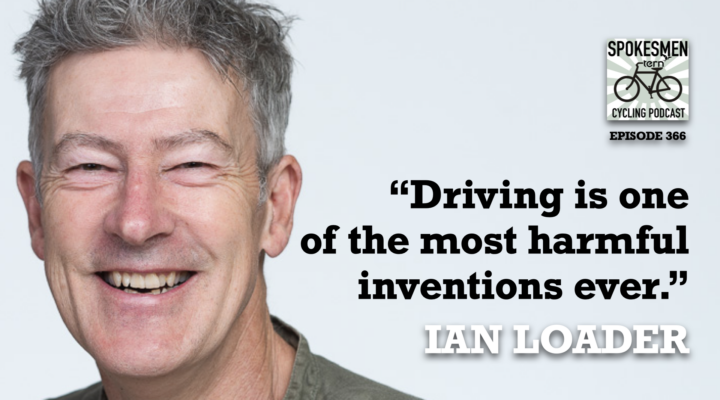
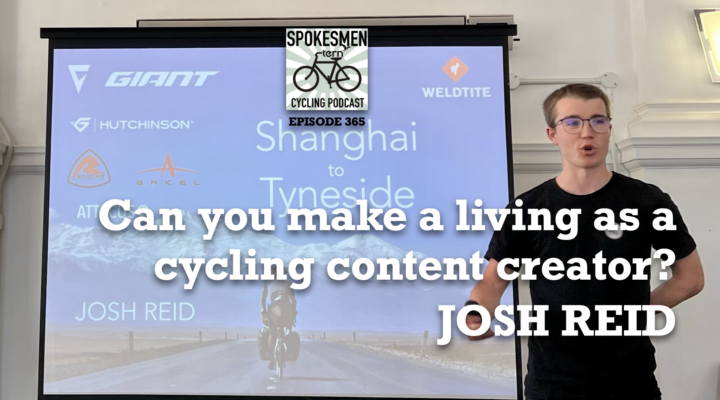

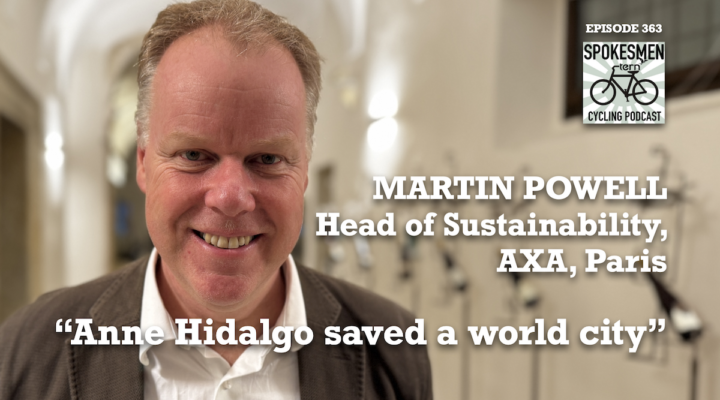
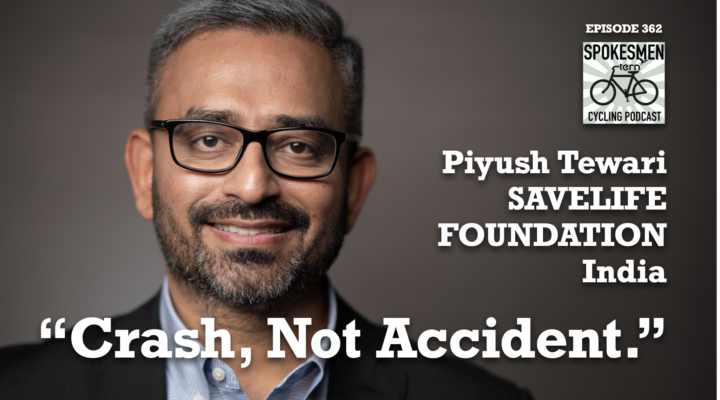
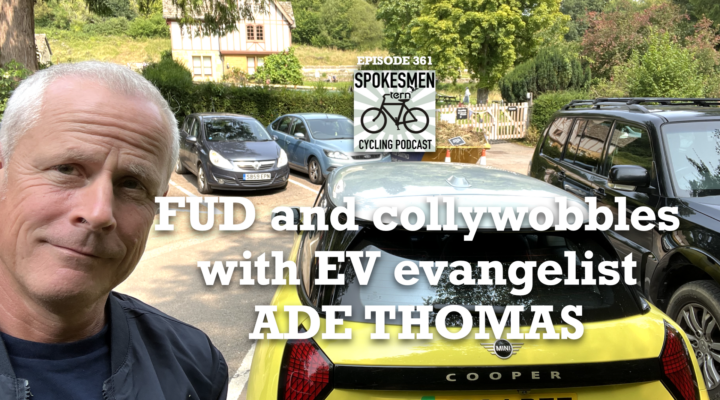

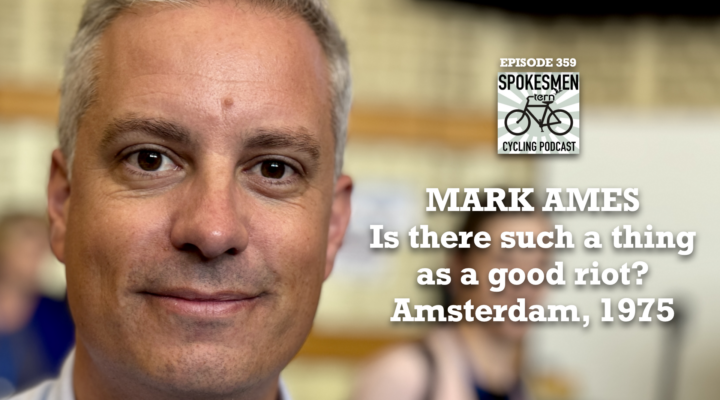
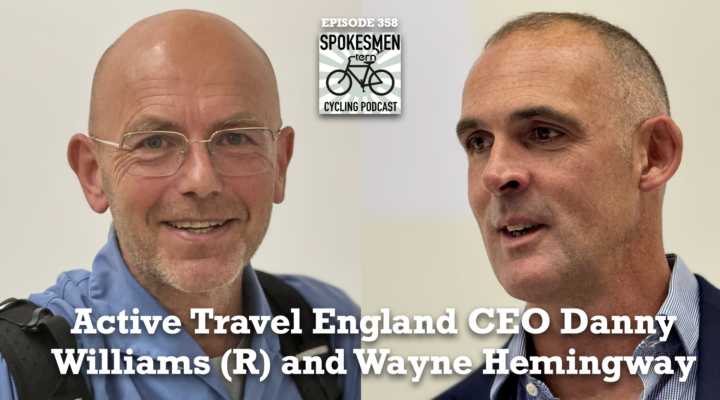
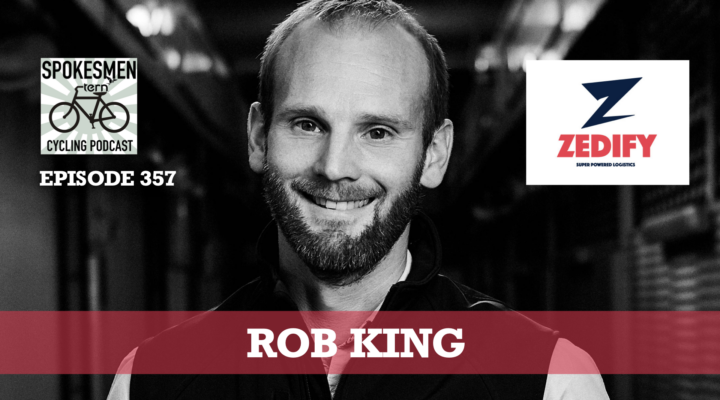



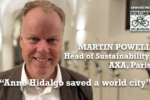






Be First to Comment